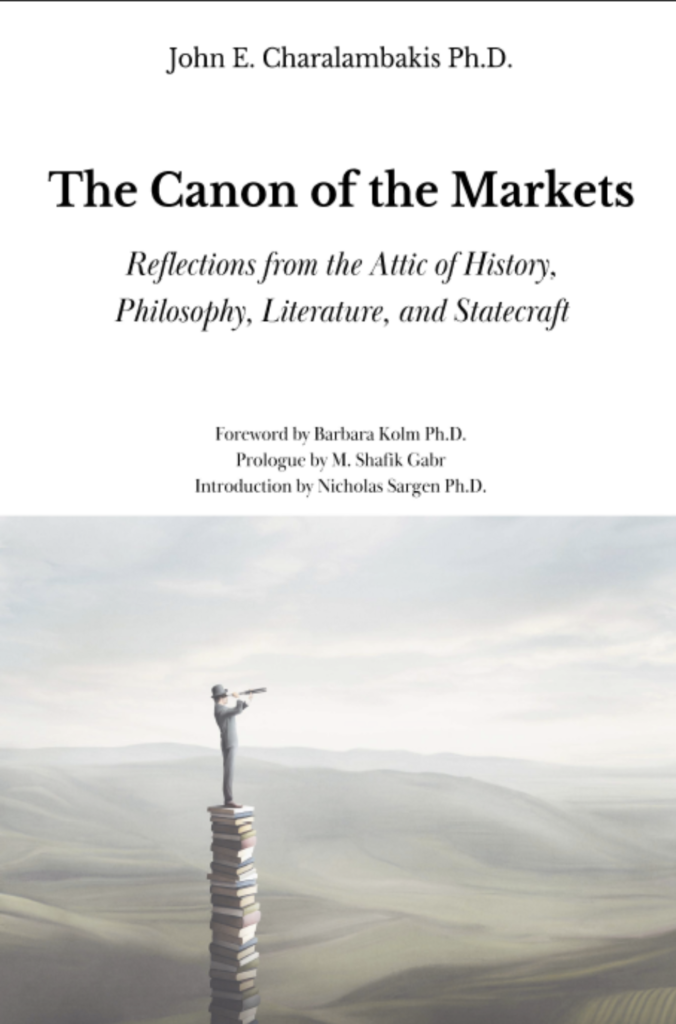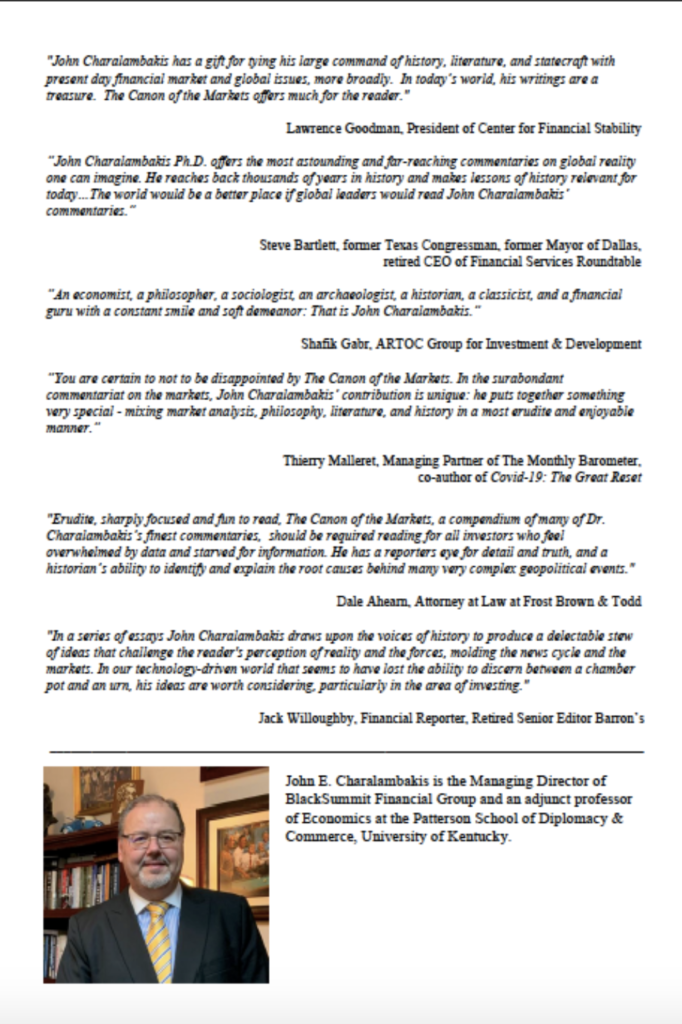“Erudite, sharply focused and fun to read, The Canon of the Markets, a compendium of many of Dr. Charalambakis’ finest commentaries, should be required reading for all investors who feel overwhelmed by data and starved for information. He has a reporter’s eye for detail and truth, and a historian’s ability to identify and explain the root causes behind many very complex geopolitical events.”
– Dale Ahearn, Attorney at Law at Frost Brown & Todd
We invite you to check out John’s new book, The Canon of the Markets: Reflections from the Attic of History, Philosophy, Literature, and Statecraft. This collection of John’s commentaries on financial markets and statecraft is now available for purchase on Amazon.com (see bottom of this message).
Introduction: This week we cover a range of issues shaping the Day After. First, we explore the issue of ballooning central bank balance sheets and the tools the Fed has to combat inflation. Second, we discover how the pandemic has accelerated the transition to automated manufacturing. Third, we dig deeper into the underlying risks of China’s property crisis. Finally, we review Russia’s dangerous role in Europe’s energy crisis.
Central Banks Must Reduce Their Balance Sheets More Aggressively
Kristin Forbes, Financial Times
While central banks have often exercised their power to step into the economy when a crisis occurs, they are much slower to step out as the economy recovers. This lack of balance leads to a long-term bloating of the bank’s balance sheet, one which is unwound slowly, if at all. While this approach works when inflation is low and unemployment remains elevated, the current situation of developed economies in general (and the US in particular) necessitates faster quantitative tightening. Not only will this prevent the economy from overheating, but it also gives the Fed more tools in its fight against inflation, and allows these tools to be deployed more gradually, giving the economy time to prepare. Given the pandemic-era housing boom in the US, unwinding mortgage-backed securities sooner than later will ease the pressure elevated prices place on the housing market. In addition, unwinding the Fed’s balance sheet helps disconnect it from the market, weakening the assumption that the central bank supports the financial markets. With more policy levers at its disposal than ever before, the Fed has a unique opportunity to utilize every tool in its kit to combat inflation while supporting a healthy recovery.
‘Factory of the future’ offers new blueprint for manufacturers
Sylvia Pfeifer, Financial Times
The Covid-19 pandemic has accelerated the transition to digital manufacturing processes, or what some are calling the “factory of the future”. British defense company, BAE Systems, has created one of these factories of the future to experiment with robots and advanced manufacturing technologies for a new combat aircraft called the Tempest. BAE’s and its partners’ use of robots has increased their accuracy ten-fold as they have been able to collect a vast amount of digital data. The primary goal of automated factories is to collect and utilize data to make manufacturing processes more efficient, less energy-intensive, and less expensive. Pandemic lockdowns forced companies to actually begin implementing digital processes instead of just “thinking about it”. Despite fears that increased automation will destroy jobs, many manufacturers are facing worker shortages today and will most likely face the same issue in the future. The Covid-19 crisis has worsened the skills shortage, particularly in the US where it is expected that as many as 2.1 million manufacturing jobs could go unfilled by 2030. While there is no doubt that many manual jobs will disappear by 2050, more technicians, data scientists, and engineers will be needed by manufacturing companies. The success of automated factories will not only require plants to be redesigned but it will also require teaching people the right skills.
Instability in China’s Property Markets
China’s Economy: the Fallout from the Evergrande Crisis
Sun Yu and Tom Mitchell, Financial Times
China’s Looming Property Crisis Threatens Economic Stability
Tianlei Huang, Peterson Institute for International Economics
China’s overleveraged real estate market has begun to threaten other sectors as colossal developers, such as Evergrande, struggle to make debt payments amid tight regulatory controls. While Evergrande’s liabilities of over 2T RMB (2% of China’s GDP) are dangerous enough in themselves, use of secondary financial instruments due to a government crackdown on risky borrowing further destabilized the real estate market. Suppliers and contractors were paid with commercial paper rather than cash due to liquidity constraints on the developer; these companies in turn used the paper to pay their vendors, creating a chain of bad debt tracing to China’s second-largest property developer. When Evergrande fails to pay, the company ultimately holding the paper sues for payment, freezing assets at each step of the borrowing line. Thus, a default on a payment of 10M RMB could freeze up to 100M RMB of assets as the overburdened courts sort out the details. Yet, off-balance-sheet debt instruments are only part of the problem – another significant contributor is the complex relationship between local governments and private enterprises. As property prices in top-tier cities have risen, municipal governments have used land sales as a revenue source, accounting for 30-40% of total revenue on average. When uncertainty increases, developers purchase less land, forcing the local authorities to seek other revenue streams. With real estate driving much of China’s economic development, and nearly 60% of household assets connected to property, there is a strong desire to keep projects from failing, yet doing so creates a moral hazard as developers begin to see their projects as being backed up by the government. In order to resolve the crisis without bringing down much of the Chinese financial system, the CCP must find a way to gradually reduce property prices while meeting rising demand for housing in high-development areas, preventing the speculation in the housing market which placed it in these circumstances in the first place.
Is Russia to Blame for Europe’s Energy Crisis?
IEA chief accuses Russia of worsening Europe’s gas crisis
David Sheppard, James Politi, and Max Seddon, Financial Times
Moscow has the EU over a barrel on energy
David Sheppard, Financial Times
The head of the International Energy Agency (IEA), Faith Birol is accusing Russia of worsening Europe’s gas crisis and using gas supplies to heighten geopolitical tensions. In the last three months of 2021, Russian gas exports to Europe were down by 20-25% year on year. While Moscow argues its meeting all of its long-term contracts with Europe, it has drained Gazprom’s storage facilities in Europe and restricted spot sales with little prior warning. Incidentally, this sharp drop in Russian gas supplies has occurred just as tensions between Russia and Europe are reaching new heights over Moscow’s military build-up on the Ukrainian border. The IEA’s accusations come as natural gas prices have reached record highs, creating a cost-of-living crisis across the continent. Things are expected to get much worse if Russia invades Ukraine. The crisis has highlighted Europe’s dependence on Russian gas and confirmed fears that Russia could use energy as a political weapon. On one hand, the pressure on energy supplies should encourage Europe to find more reliable partners and reduce its reliance on Russian gas. On the other hand, Europe is in an extremely vulnerable position which is just where Russian President Vladimir Putin wants them. As David Sheppard puts it, “Today’s intertwined crises in gas prices and Ukraine should finally force action from Europe to reduce its reliance on Russian gas as quickly as possible. That it has not done so already represents a huge failure by European policymakers, leaving a strategic weakness at the heart of the continent.”


